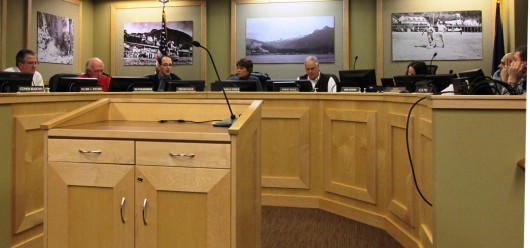The Ketchikan School District’s budget was a big topic Wednesday for the School Board, starting right at the beginning with public comment.
Sonya Skan coordinates the Tribal Scholars Program, which is a cooperative education program run by the district and Ketchikan Indian Community. She told the board that the program offers an alternative method of teaching. And for the Native kids enrolled, it’s making a big difference.
Skan was disappointed that two early drafts of next year’s budget place Tribal Scholars at the bottom, underneath the “red line,” which means its likelihood of getting funded is low.
“And that does concern me, because I know that I’ve heard you guys say that you believe this is a program that you believe is helping our children that represent about 33 percent of your student population,” she said. “So, when you have … that many kids, representation of a people group, I would think that you would do something for them that could help. I feel like that hasn’t been happening is evident in where we lie in your process.”
The Tribal Scholars Program is funded now by a three-year grant. This is the final year of that grant. Skan said KIC has budgeted some money for the program, and they hope that the grant will be offered again. But, even if it is, awards won’t be announced until September.
Board members told Skan that they do support the program and want to fund it. They have just started the annual budget process, and things can change.
During his report to the board, Superintendent Robert Boyle announced that the proposed cuts in the state budget at this point mean a $611,000 shortfall for the Ketchikan School District. The two drafts budgets presented Wednesday don’t take that into account.
Board President Michelle O’Brien said that the budgets show some serious cuts already. She notes that the Ketchikan School District spends a very small percentage of its budget on administration.
“There are districts around the state that have huge budgets in comparison for office stuff. We choose to put it into direct instruction,” she said. “That’s why it’s important that we come together as a community because, as I’ve said, we’re at the bare bones.”
In a related item, the board postponed voting on a resolution formalizing a new school district budget format agreed upon by the School Board and the Ketchikan Gateway Borough Assembly.
Board Member Trevor Shaw was concerned that contractual services were placed under the “discretionary spending” category. He said funding for those services is not discretionary and he doesn’t want the public to get the idea that the money could be used elsewhere.
The topic will be brought up during next week’s School Board-Assembly liaison meeting.
Under discussion items, the board talked briefly about marijuana legalization and how the district might have to respond through policy amendments. Human Resources Director Rick Rafter told the board that the high school already is drafting changes to some of its policies.
“Their policies that chaperones sign and coaches sign when they travel with teams and are around teams will treat marijuana the same as they treat alcohol, which said, when you’re on a trip with kids, you can’t be consuming alcohol,” he said. “So, it’ll be the same. They’ve had a committee working on those policies for the past couple of months.”
Rafter said other Alaska school districts also are looking into what might be needed in response to legalization. He suggested that the board contact someone from the Association of Alaska School Boards to find out what, if any, recommendations that statewide organization has.
The School Board also discussed establishing a minimum age for students to be picked up or dropped off alone from a school bus. There was concern about students aged 6 or under walking home from a bus stop alone, especially on a dark winter day.
The board directed Boyle to bring an action item establishing a minimum age back for the next regular meeting, which is Feb. 25.






